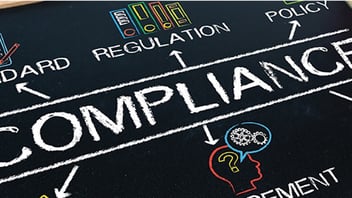Marketing words, even at the best of times, can feel like a foreign language.
Just like the Oxford dictionary itself, marketing lingo is always expanding. Every now and then the industry sees new terms, phrases, and keywords added to its vocabulary.
Are you finding yourself caught up in the jargon? Don’t worry, you’re not alone, but it pays to have your own vocabulary up to scratch.
We have compiled the Ultimate Marketing Words Dictionary that will help your conversations thrive, give you a better understanding their terms and definitions, and save your face from confusion next time you’re mid-discussion.
A/B Testing: Testing two versions of a webpage, email subject line, landing page, etc. to see which one performs better. A/B tests are commonly applied too many forms of copy testing to determine which version drives the more desired result.
Acquisition: The acquiring by one firm of another firm’s technology, product rights, or the entire business.
Ad Clicks: The number of times a user clicks on an online advertisement.
Advertisement: This is an announcement or persuasive message placed in the media by a company, organisation, or individual.
Advertising Agency: An organisation that provides marketing communications and services to clients seeking assistance in their marketing activities.
Analytics: This is the discovery and communication of meaningful patterns in data from metrics like web activity, traffic, social media, and sales. Analytics represent various conditions and actions to achieve specific business results.
“At Digital Media Stream, we use Google Analytics to monitor and measure all our marketing efforts. This way we can identify our strengths and weaknesses, align our methods, and optimise our strategies to their full potential”
Attributes (Product): The characteristics by which products are identified and differentiated, usually features, uses and benefits.
Awareness Stage: The stage at which the potential buyer is realising a want or need for a product and/or service.
Banner Ad: Image-based graphics that typically run across the top of a webpage and, when clicked, take visitors to another website.
Blog: Run by individuals or small groups, these are regularly updated websites or web pages written in an informal or conversational style.
Bounce Rate: This refers to the percentage of visitors to a particular website who navigate away from the site after viewing only one page.
Buyer’s Journey: The process buyers go through to become aware of, consider and evaluate, and decide to purchase a new product or service.
Buyer Persona: A semi-fictional representation of your ideal customer based on market research and real data about your existing customers.
Business-to-Business (B2B): Refers to businesses that market products or services to other businesses.
Business-to-Consumer (B2C): Refers to businesses that market products or services to consumers.
Click Through Rate: The proportion of visitors to a web page who follow a hypertext link to a particular site.
Cold Calling: An outdated marketing method by which a salesperson calls on totally unfamiliar organisations and prospects (Inbound all the way).
Content Marketing: A type of marketing that involves the creation and sharing of online material.
Content Management System (CMS): A program that manages all of the aspects of creating content.
Consideration Stage: The stage at which the potential buyer defines their problem and researches options to solve it.
Customer Relationship Management (CRM): This is a system that allows businesses to manage business relationships, the data and information associated with them.

Decision Stage: The stage at which the buyer chooses a solution.
Digital Marketing: The marketing of products or services using digital technologies, mainly on the internet, but also including mobile phones and other digital mediums. Read our comprehensive digital marketing guide right here.
Direct Marketing: Directly communicating and dealing your marketing activities with your primary target audience.
Domain: This is the name of a website (For example, the domain name for Digital Media Stream’s central web server is https://digitalmediastream.co.uk/)
EBook: An electronic book that is distributed as a digital file and can be used on any compatible computer or mobile device.
E-Commerce: Commercial transactions conducted electronically (Selling digitally) on the internet.
Email: Short for electronic mail, this is the exchange of computer-stored messages by telecommunication.
Engagement Rate: This is a metric that measures the level of engagement that a piece of created content is receiving from its audience. Factors that influence engagement include comments, likes, shares, and more.
Forecasting model: A marketing forecasting model is an analytical technique that represents causal relationships among various conditions and actions taken to achieve specific business results. The model will forecast future outcomes of various potential actions and conditions.
Generation X: The latest generation typically noted for high levels of education, entrepreneurship, self-reliance, and scepticism toward political and social institutions.
Global Strategic Partnership: This is the cooperation strategy between companies who jointly pursue a common goal.
Hashtag: A word or phrase preceded by a hash sign (#) and used on social media websites and applications that identify messages on a specific topic. Hashtags are generously used on Twitter.
HTML Email: An email that is formatted using HTML, as opposed to plain text, which provides flexibility with an email’s format and appearance.
HubSpot: A developer and marketer of software products for inbound marketing and sales founded by Brian Halligan and Dharmesh Shah in 2006.
“Our business chose to use HubSpot as our preferred method of inbound marketing software. It has been essential in all of our marketing efforts. So much so, we are a Gold HubSpot Agency Partner.”
Inbound Marketing: Inbound marketing is a method of attracting, engaging, and delighting people to grow a business that provides value and builds trust.
Infographic: A acronym for ‘information graphic’, it is a representation of information in a graphic format designed to make the data easily understandable at a glance.
Influencer: An influencer is an individual who has the power to affect purchase decisions of others because of his/her authority, knowledge, position or relationship with his/her audience.
“Influencers are the kings and queens of content creation, pumping out piece after piece of high-quality, engaging content. Essentially, they’re content machines.”
Internal Marketing: The promotion of a company's objectives, products and services to employees within the organisation.
Investment Strategy: The decisions investors and fund managers make - for instance, on how to allocate funds between different asset classes - to achieve returns according to their investment philosophy or style.
Keyword (search): A type of search that looks for matching documents that contain one or more words specified by the user.
See:
Key Performance Indicator (KPI): A measurable value that demonstrates how effectively a company is achieving key business objectives.
Landing Page: Refers to any web page that a user arrives at after clicking a hyperlink.
Lead: This refers to contact with a potential customer, also known as a ‘prospect’.
Lead Generation: This is the initiation of consumer interest or enquiry into products or services of a business. Leads can be created for purposes such as list building, e-newsletter list acquisition or for sales leads.
Lifetime Customer Value: A metric that represents the total net profit a company makes from any given customer.
Long Tail Keywords: Long tail keywords are longer than three words, and refer to more granular subjects. "Digital marketing for insolvency practitioners" is a long tail term, while "marketing" (referring to a very broad topic) would be considered short tail.
LSI Keywords: LSI stands for Latent Semantic Indexing, and this term refers to keywords not directly related to the keyword in question, but which share enough thematic relevance to give search engines a better idea of the wider subject matter. "Neil Patel" and "results" would be LSI keywords for "marketing," for example.
Macromarketing: The influence that marketing policies and strategies have on an economy and society as a whole.
Market Research: High-intelligence research and development of a specific industry for the betterment of sound business decisions.
“Market Research offers plenty of benefits, for example, it is always good to know how you measure against your competitors. Market research finds out just where you are and then, according to the results, you can take action to change perception.”
Marketing Automation: This refers to the software that exists with the goal of automating marketing actions. Many marketing departments have to automate repetitive tasks such as emails, social media, and other website actions.
Marketing Metric: A key indicator of how well your marketing efforts for your individual product or service are delivering.
Marketing Qualified Lead (MQL): A lead who has been deemed more likely to become a customer compared to other leads.
Meta Description: The meta description is a snippet of up to about 155 characters – a tag in HTML – which summarises a page's content. Search engines show the meta description in search results mostly when the searched-for phrase is within the description, so optimising the meta description is crucial for on-page SEO.
Net Profit: The profit of a company after operating expenses and all other charges including taxes, interest and depreciation have been deducted from total revenue.
Negative Keywords: keywords that are filtered out to prevent ad serves on them. This avoids irrelevant click-through charges.
Offer: This is an asset that you’ll offer prospects on a landing page. The offer is designed to help you generate leads.
OKR (Objectives & Key Results): A goal system used by Google and a simple tool to create alignment and engagement around measurable goals.
Open Rate: Expressed as a percentage, this indicates how many emails were opened.
Pay Per Click (PPC): A type of sponsored online advertising that is used on a wide range of websites, including search engines, where the advertiser only pays if a web user clicks on their ad.
Pipeline (Sales): A sales pipeline is a visual representation of sales prospects and where they are in the purchasing process.

Product Life Cycle: It describes the stages a product goes through from when it was first thought of until it finally is removed from the market. Not all products reach this final stage. Some continue to grow and others rise and fall.
Prospect: A potential customer that has been qualified as fitting certain criteria. In most cases, a prospect: Fits your target market. Has the means (money) to buy.
Referral: A prospect or lead generated from someone who may be interested in what the salesperson is selling.
Research & Development: the function of working through various sciences and technologies to design new marketing products.
Return On Investment (ROI): ROI is usually expressed as a percentage and is typically used for financial decisions, to compare a company's profitability or to compare the efficiency of different investments.
Retention Rate: This refers to the percentage of net income that is retained to grow the business, rather than being paid out as dividends.
Roadmap: Roadmaps show everyone on your team and in your organisation what your high-level strategy is and how you plan to achieve it through goals and initiatives.
Sales Funnel: This is a graphic representation of the sales stages a customer goes through when buying a product
Sales Qualified Lead: A customer who has indicated to a customer service team member that they're ready for a conversation with a sales rep about new products or services.
Sales Revenue: The income that a firm receives from selling its products or services to the public.
Search Engine Optimisation (SEO): Refers to techniques that help your website rank higher in search engine results pages (SERPs).
Short Tail Keywords: Search terms of three words or less, usually referring to broad or top-level subjects. "Marketing" or "digital marketing" would be short tail keywords, while "digital marketing for recruitment agencies" would be considered long tail (notice the greater level of detail.
SMART Goals: Are concrete targets that you can easily aim for. They're realistic, quantifiable, and focused, so you know exactly how to accomplish them. If you're wondering what SMART means, it's an acronym that helps you clearly define these goals, pushing you to produce real results.
Target Market: A group of consumers or organisations most likely to buy a company's products or services.
Thumbnail: A small image that represents a larger one.
Traffic: Website traffic refers to web users who visit a website. Web traffic is measured in visits, sometimes called ‘sessions’, and is a common way to measure your businesses effectiveness at attracting an audience.
User: A User is the one who has the authority to consume a product or service to solve a problem or to obtain a benefit.
Viral Marketing: Any marketing technique that induces websites or users to pass on a marketing message to other sites or users.
Website: A group of web pages usually containing hyperlinks to each other and made available online by an individual, company, educational institution, government, or organisation
Workflow: A series of automated actions that you can trigger to occur based on a person's behaviours or contact information.
So, did you learn any new marketing terms? Hopefully, your vocabulary has grown and you have future proofed yourself from any forthcoming marketing bewilderment.
If you're still feeling stumped, catch us on our Linkedin and check in with one of our marketing experts for crystal clear definitions.


.png?width=352&name=No.09%20(1).png)

